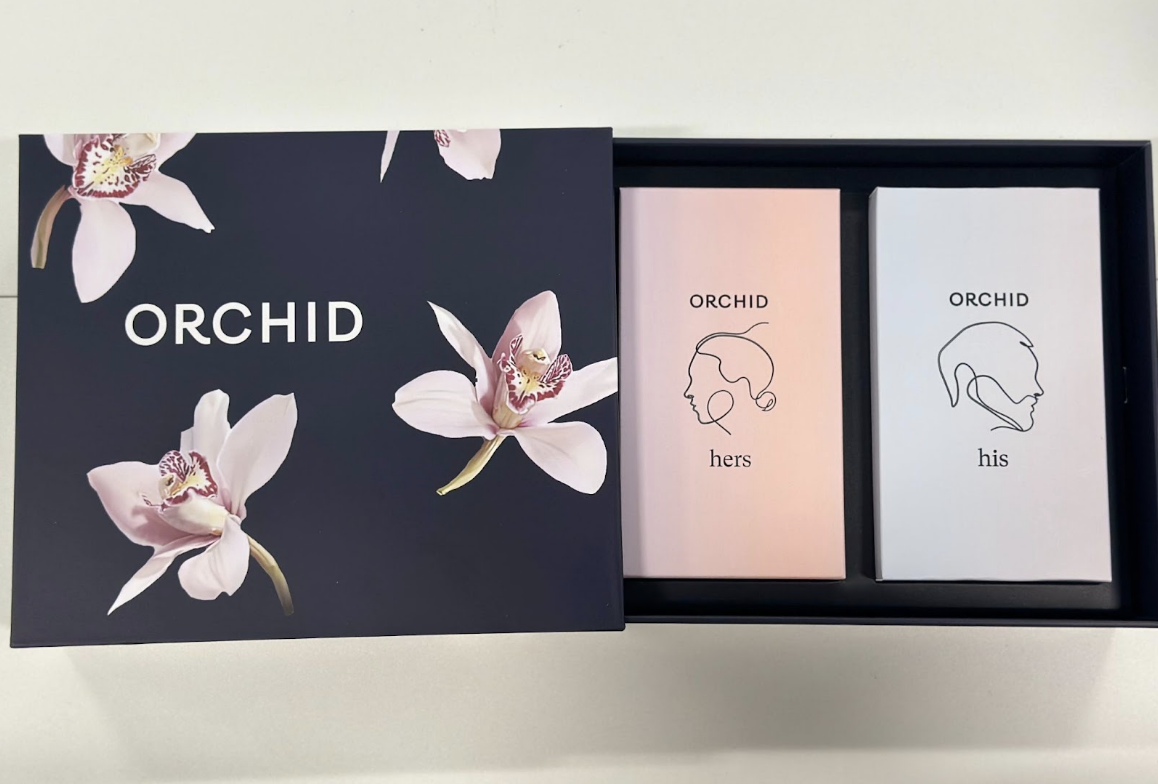Why would Orchid want my saliva
One of the key advantages to working with Orchid (in addition to getting 100X more data than traditional embryo screening) is that parental saliva samples from the egg and sperm source are not required. However, there are several reasons why you may still wish to provide a sample. Not only can parental saliva samples help to interpret the embryo data, there are other types of testing which you may benefit from.
Types of Testing:
- Parental Confirmation: This confirms the relationship to the embryo biopsy through the parental DNA to confirm the egg source and sperm source are as expected. Results of ‘Yes’ or ‘No’ will be provided on a per-embryo basis. Parental confirmation will not be provided on embryo biopsies for which no result is obtained, or those found to have a chromosomal abnormality (classified as ‘aneuploid’).
- Origin of Aneuploidy: This testing determines whether chromosomal differences (aneuploidies) detected in embryos originated from the egg or sperm. Results will indicate whether the identified aneuploidy is maternal (mat) or paternal (pat) in origin - e.g. an extra copy of chromosome 21 from the egg would be +21(Mat) whereas a missing copy of chromosome 18 from the sperm would be -18(Pat). This screening is only performed on embryos classified as aneuploid or mosaic.
- Need to Know:
- Determining the origin of aneuploidy does not mean that the egg or sperm source themselves have a chromosomal abnormality, nor that there is necessarily anything wrong with either the egg or the sperm. Chromosomal abnormalities are typically random, sporadic events that increase with parental age and are seen in nearly every IVF cycle.
- Origin of Aneuploidy analysis requires both the egg source and sperm source to submit samples.
- Reflex Testing: If a genetic variant is identified in an embryo, reflex parental screening will assess if the variant in the embryo is suspected to be maternally inherited, paternally inherited or de novo (happened by chance in the embryo: non-inherited).
- Need to Know:
- This will not replace diagnostic testing for the egg and/or sperm source, and Orchid genetic counselors will still make recommendations for follow-up testing.
- If a variant is suspected to be inherited, this could have insurance and long term disability implications for the likely positive parent.
- Couple’s Report: This testing calculates genetic risk scores (GRS) for common, chronic conditions for both gamete sources as individuals, and also runs a simulation to calculate the likely range of risks to expect in embryos. Not only does this provide insight into your own genetic risks, it puts the embryo GRS results in context for what was possible given the parents’ own scores - read more here.
- Need to Know:
- Only available if both gamete sources provide saliva and consent to testing.
- Does not provide diagnoses for the egg and sperm source, but may identify previously unknown genetic risks.
- Does not include monogenic conditions and does not replace carrier screening or any other recommended genetic testing for monogenic conditions.
- The number of scores calculated is dependent on genetic ancestry.
Is there a cost for parental testing
Yes, typically there is a small per-cycle cost associated with the processing of saliva samples which will depend on the analysis chosen. Your Orchid genetic counselor will review these costs with you and you’ll be provided a pricing consent when you opt in to Orchid’s screening.
Why did Orchid require my saliva for my PGT
Typically, providing saliva samples is optional, although, depending on the analysis requested on your embryos, Orchid may have strongly recommended, or required you to provide saliva samples. This can happen when either the egg and/or sperm source is known to have a genetic condition they wish to screen embryos for. In the case of such targeted embryo screening requests, parental saliva becomes extra important for confirming any results in embryos, so your Orchid genetic counselor may request that you provide saliva samples.
What happens to my data if I provide a saliva sample
Your provided saliva sample will only be used in the analyses that you select on your Orchid consent form and which are ordered by your IVF provider. Orchid is a CLIA and CAP certified genetic testing laboratory and we are therefore required to store data for a minimum of 2 years. We are HIPPA compliant and take your privacy seriously - you can read our full policy here.
My saliva sample failed - is this normal
It's not unusual for saliva samples to fail - in fact, about 10% do! Following the directions on your Orchid kit closely can decrease the risk of your sample failing, but in the event it does, our team will be in touch to arrange a replacement. No news is good news - if you shipped your sample and haven’t heard back no further action is needed from you.
Questions about Orchid’s parental testing options? Reach our board certified genetic counselors at genetics@orchidhealth.com.







